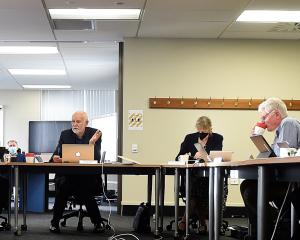Marg Madill, of Dunedin, speculates on the reasons why the Southern District Health Board rejected Presbyterian Support Otago as a contractor for home support services.
There has been a profound absence of explanation from our elected and accountable representatives on the Southern District Health Board regarding their decision not to offer Presbyterian Support Otago (PSO) one of the contracts for providing home support services in our community.
This, and their disinclination to meet with PSO board members, leaves me with no option other than to speculate about what the reasons for such a decision may have been.
Before discussing my thoughts and conclusions on this, however, I wish to provide some information for any DHB members who may be lacking in an understanding of those who, like me, are employed by PSO to undertake home support work.
For most of the 10 years prior to my working with PSO, I was employed by Otago University as a lecturer in community development and social work. Some of my teaching in this department was specifically focused on issues facing older adults in our communities.
In addition, I provided supervision for students undertaking professional practice placements at various social service agencies and also supervised professional practitioners in the field. I have a master's degree in education, a postgraduate social work qualification and am a qualified early childhood teacher.
Having also cared for my mother, who lived with Parkinson's and dementia, for a number of years, I had a growing interest in issues facing older people, their vulnerabilities and strengths and the type of services and organisations that might best meet their needs.
When I was successful in my application for work with PSO's community support team my previous qualifications and experience did not allow me to sidestep any of the training offered, or the need to gain the industry's recognised qualifications. Neither should it have, as this would have disavowed the level of professional expertise held by my colleagues and their extraordinary adeptness in their work.
When I left my employment at the university I had a clear idea of what I wanted to do and who I wanted to work for. I was seeking work in the community that engaged with and achieved the outcome of enabling older people, with a need for support, to continue living in their own communities.
I was also clear that the best way to achieve this aim was to work as an employee of a social service agency that took its place in the community, and its accountability to that community, seriously.
Gillian Bremner, as chief executive for PSO, has on numerous occasions publicly spoken out on community and social issues. PSO has, for example, engaged in long-term research into issues of poverty and income levels in our community. In such ways, PSO has engaged in a form of public transparency and accountability that is crucial to the development of a negotiated understanding of the needs of the community being served.
In turn, this understanding enables the organisation to deliver a safe and meaningful service to the people being served. Such community engagement is not, to my mind, an optional component of service delivery. Rather, it is a vital part of ensuring that the services provided are cognisant of how various issues, such as poverty, may interact with clients' service needs: that services provided are driven by, and engage with, the changing needs of those in our communities who are most vulnerable.
I can only conclude that the reason for PSO not being offered a contract to continue providing its home support services is precisely because it is a local social service agency with a long and respected history in our community.
It seems to me that the DHB's lack of accountability to our community, in both its decision and its decision-making process, is in this instance simply evidence of careful and strategic management; management which seeks to ensure that ideas of social service and community accountability are divorced from decisions regarding service provision for our older people.
In relation to the long-term outcomes for us all in our communities, this is a move that has serious implications. While the DHB may claim that, in the first instance at least, money had no part to play in its final choice of service providers, to have removed ideas of social service and accountability from the provision of services for older people means that such services may be reconfigured into a series of time-constrained tasks, answerable to purely economic imperatives. Once this has occurred then moves to further cut and constrain that service provision are all the easier and inevitable.
When PSO, as an agency with a wider social service agenda and engagement, is removed from the provision of home support services for older people, those services, like our communities, will lose an essential moderating force and perspective in this area of the social services. We are then another step closer to services for older people in New Zealand being an international trading commodity with no specific community base.
As growing old is a certainty for us all, the DHB board members will themselves reap the rewards of their own judgements.











